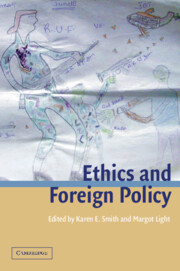Book contents
- Frontmatter
- Contents
- Notes on contributors
- 1 Introduction
- Part I Theories
- Part II Instruments and policies
- 5 Exporting democracy
- 6 Ethical foreign policies and human rights: dilemmas for non-governmental organisations
- 7 The international criminal court
- 8 Constructing an ethical foreign policy: analysis and practice from below
- Part III Case studies
- References
- Index
5 - Exporting democracy
Published online by Cambridge University Press: 22 September 2009
- Frontmatter
- Contents
- Notes on contributors
- 1 Introduction
- Part I Theories
- Part II Instruments and policies
- 5 Exporting democracy
- 6 Ethical foreign policies and human rights: dilemmas for non-governmental organisations
- 7 The international criminal court
- 8 Constructing an ethical foreign policy: analysis and practice from below
- Part III Case studies
- References
- Index
Summary
Introduction
When the question of ethics and foreign policy is raised, the policies that usually come first to mind are the promotion of universal standards of human rights or, more recently, the propriety of military intervention for humanitarian purposes. Respect for human rights is the hallmark of a democratic society and democratic governments rarely implement oppressive policies that require external military intervention for humanitarian purposes. A major objective of a foreign policy that is informed by ethics is, therefore, the institution or renewal of democracy. Promoting human rights is a relatively recent foreign policy goal. Using force for humanitarian purposes is older. Exporting democracy predates both. The United States and some of the former European colonial powers have a long history of fostering democratic development in foreign countries.
Governments have a variety of motives for promoting democracy in other countries. One reason is the belief that democracy is a good system of government, or at least, to quote E. M. Forster, that it is ‘less hateful than other contemporary forms of government’ (Forster, 1965: 77). But governments also export democracy for self-interested motives: they believe, for example, that it is easier to deal with foreign governments that share the same values. They also associate democracy with peace, and they promote it abroad to increase their own security at home. After the collapse of communism and the victory of capitalism, western governments appeared to think that a market economy would, in itself, generate democracy.
- Type
- Chapter
- Information
- Ethics and Foreign Policy , pp. 75 - 92Publisher: Cambridge University PressPrint publication year: 2001
- 6
- Cited by



